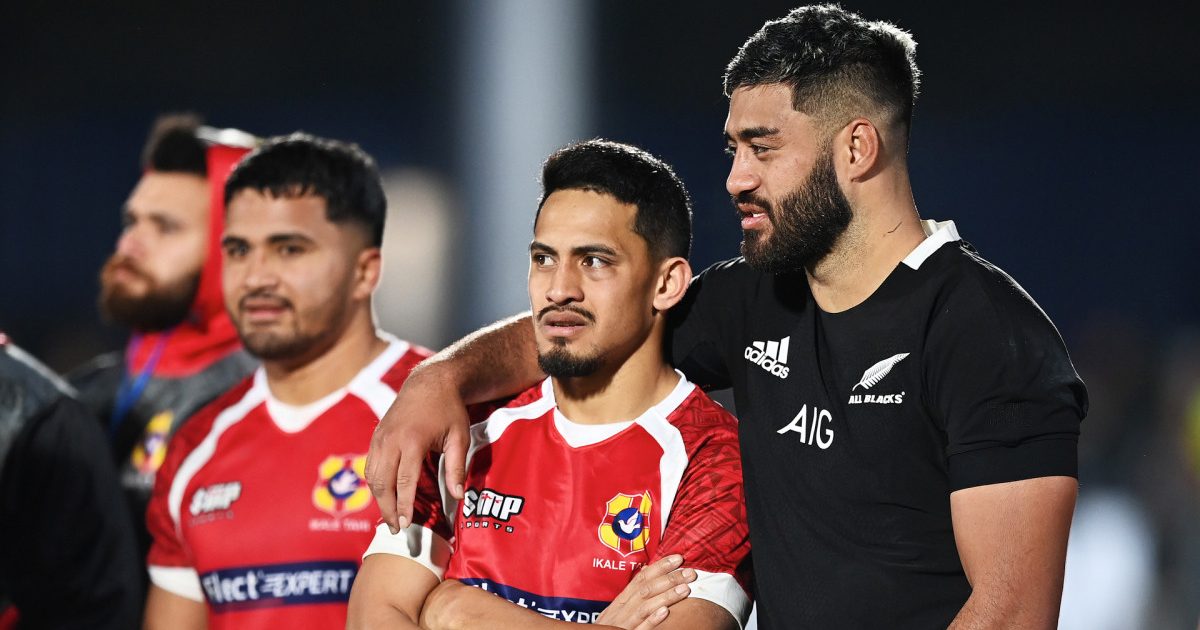NZR's approach to profiting from Tonga cheapened everything

The befuddlement was not confined to Ian Foster.
New Zealand Rugby (NZR) clearly felt a few token days down south and plenty of waffle about the warm welcome and big hearts of the local population would have been enough to sell Saturday’s stinker at Mt Smart Stadium.
We’ll get back to the perpetually-confused Foster, but let’s linger on NZR a minute.
I won’t bore people with a rehash of the All Blacks’ 102-0 win over Tonga. The less said about that game, the better.
But let’s look at the concept NZR stumbled upon. This idea that they could cynically show up in South Auckland, patronise the locals and then sit back and watch them pay for the privilege of watching Tonga get annihilated.
You might have noticed the vigour with which Tongan fans watch their national rugby league team. You might be aware of that team’s deeds at the 2017 Rugby League World Cup, where they beat hosts New Zealand, before defeating Great Britain and Australia two years later.
You might also know that Mate Ma’a Tonga are more than just a rugby league team. They are a cultural phenomenon and a rallying point for Pasifika people everywhere.
Mate Ma’a Tonga are made up of men who’ve played for New Zealand and Australia. It’s ranks include those who’ve turned their back of the game’s Holy Grail – State of Origin – in favour of honour and patriotism.
There is money in playing rugby league for Australia; even more in representing New South Wales. And yet these men chose Tonga.
That’s all very noble, but then these blokes won too. Jason Taumalolo and Sio Siua Taukeiaho and Daniel Tupou and Andrew Fifita and Michael Jennings and Will Hopoate and David Fusitu’a and Manu Ma’u didn’t just turn their back on rugby league’s big boys – they beat them.
You never want to question the motives of an All Black with dual nationality, but these boys opted for Tonga. And not at the end of their careers either, but in their prime.
These guys were tired of having their culture overlooked in other teams, they’d harboured years of hurt at how their parents were treated in their adopted nations and they simply wanted to play for pride.
It’s not hard to see why fans of all persuasions then rallied round these men and why stadiums became a sea of red. Fans in this country are used to being deafened by music at sports events and here were Mate Ma’a Tonga’s fans treating us to hymns instead.
NZR thought they could get a piece of that. They reckoned those same people could be conned into coming to a rugby league ground to watch rugby. They assumed Tongan fans were simple and were simply supporting a flag or a jersey, rather than a cultural movement. They were arrogant enough to believe that sending the All Blacks to do a bit of promotional work in South Auckland would suddenly get all the locals onboard.
Well, guess what? NZR were wrong. They sought to profit off the Tongan community and merely cheapened their own All Blacks brand in the process.
One hundred and two points later, Foster fronts a press conference and is immediately confused by the questions. Where he clearly expected a round of applause and breathless praise of his selections and tactics, the All Blacks coach was met with questions about what a poor night it had been for rugby.
It’s Foster’s job to pick a team and coach it. It is not – and will never be – his job to dictate how that team is covered.
If Foster thinks the All Blacks were fabulous against Tonga, it’s his job to convey that to the team. The media might appear to be the All Blacks’ unofficial publicity arm on occasions, but they’re actually not. Journalists are not there to pump players’ tyres up.
There was nothing to like about Saturday’s shellacking and it would’ve been unprofessional of media to pretend otherwise.
It says a lot about Foster that he assumed he and the team would be congratulated on their victory, just as the mere staging of this match shows how out of touch NZR can be. They all thought we’d fall over ourselves to say what a magnificent occasion it had been, when the reality was anything but.
And just for good measure, we’ve got a couple more helpings in store. Fiji promise to be cannonfodder too, as the All Blacks and NZR tick the boxes necessary to pretend they promote Pacific Islands rugby.
Saturday was a farce and it’s confounding that Foster and company couldn’t see that.

























































